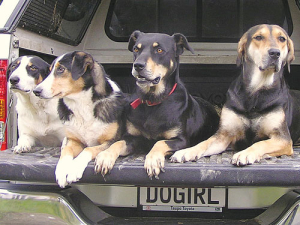The Kiwi way
OPINION: This old mutt has been around for a few years now and it seems these ‘once in 100-year’ weather events are occurring nearly every year.
 Approximately two thirds of Kiwi homes have one or more companion animals such as cats, dogs, or birds.
Approximately two thirds of Kiwi homes have one or more companion animals such as cats, dogs, or birds.
The Ministry for Primary Industries (MPI) has announced that it will lead a national effort to increase the number of New Zealanders trained to care for and handle companion animals during civil defence emergencies.
MPI team leader for animal welfare emergency management Gina Kemp says approximately two thirds of Kiwi homes have one or more companion animals such as cats, dogs, or birds.
“In emergencies, people are often reluctant to evacuate if they are not able to take their pets,” Kemp says. “This can put their lives in danger and those of emergency responders.”
“MPI is partnering with the International Fund for Animal Welfare (IFAW) to deliver 13 two-day training workshops across the country to help grow skills and capacity among councils, government agencies, zoos, wildlife parks and iwi organisations,” she says.
The first workshop is set to be held in Wellington on 13-14 July and is already fully booked.
“Through training provider Fire Rescue and First Response, participants will be taught an NZQA-registered unit standard on providing companion animal welfare during a civil defence emergency,” Kemp says
“A key part of the training will be to teach organisations how to set up temporary animal shelters, such as the facility operated at the Hastings Racecourse to care for companion animals, wildlife, and horses during Cyclone Gabrielle. It’s where we were first introduced to IFAW’s Oceania team who were supporting the shelter’s operations.”
Kemp says that existing shelters and pounds are regularly full.
“These workshops will increase knowledge among people running evacuation centres during civil defence emergencies to handle animals.
“That includes training on preventing injuries and the spread of diseases, such as those that can be transmitted between animals and people.”
IFAW animal rescue programme officer Robert Leach says the partnership with MPI will help reduce barriers to people taking their companion animals to evacuation centres or shelters during emergencies while improving animal welfare outcomes.
“We will share our experience and case studies gained from decades of IFAW leading disaster response efforts across the globe,” Leach says.
“Most recently we helped save pets and wildlife from Ukrainian war zones, wildfires in Greece, and floods in France, and we continually assist authorities and communities around the world to prepare for and respond to disasters.”
MPI has received almost 200 expressions of interest from people and organisations keen to take part in the workshops.
The World Wide Sires National All Day Breeds Best Youth Camp Best All Rounder plaudit has become family affair, with 2026 Paramount Cup winner Holly Williams following in her sister Zara's footsteps.
DairyNZ is giving New Zealand farmers a unique opportunity to gain hands-on governance and leadership experience within the dairy sector.
Herd improvement company LIC has posted a 5.2% lift in half-year revenue, thanks to increasing demand for genetics.
According to the latest Fresh Produce Trend Report from United Fresh, 2026 will be a year where fruit and vegetables are shaped by cost pressures, rapid digital adoption, and a renewed focus on wellbeing at home.
The Roar is a highlight of the game hunting calendar in New Zealand, with thousands of hunters set to head for the hills to hunt male stags during March and April.
OPINION: The past few weeks have been tough on farms across the North Island: floods and storms have caused damage and disruption to families and businesses.